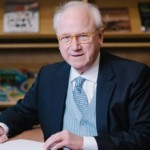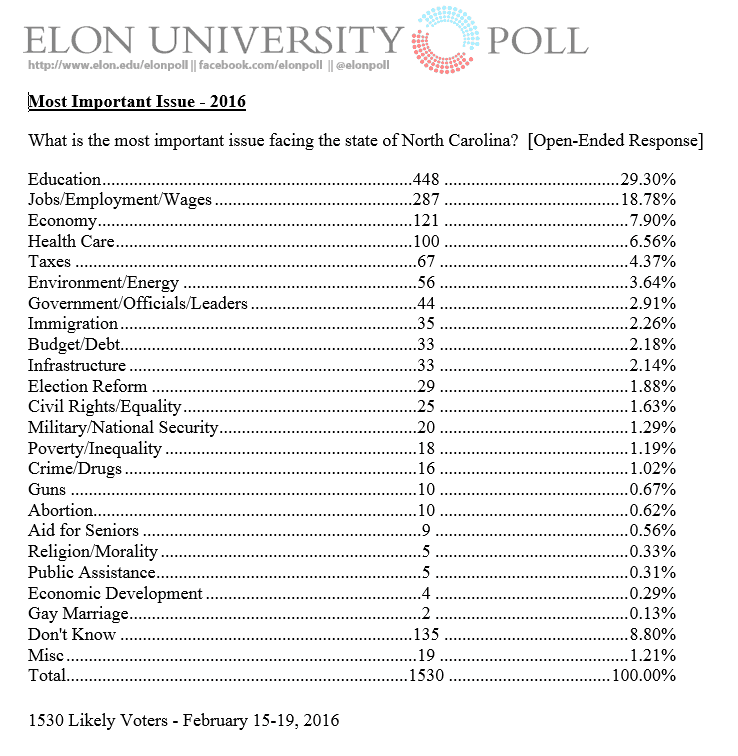In preparation for a project on North Carolina’s priorities, the N.C. Center for Public Policy Research requested that the Elon University Poll ask North Carolinians, “What is the most important issue facing the state of North Carolina?”
Shortly before the presidential primary last month, the Elon University Poll surveyed North Carolina voters, and of the 1,530 likely voters who responded, nearly three out of 10 cited “education.”
Education, in fact, led the list of issues offered in answer to that open-ended question. Next came “jobs/employment/wages,’’ cited by 287 voters (19 percent), followed by the “economy,’’ picked by 121, (8 percent). Together the jobs and economy respondents add up to 408 voters, fewer than the 448 voters (29 percent) who cited education.
An open-ended question in a statewide telephone poll gives only a broad indication, not a substantive, nuanced discussion, of issues on voters’ minds. Still, the Elon poll-takers came up with findings that serve as context for the session of the General Assembly to open later this month and for the statewide campaigns, already in gear, for the November general elections.
The Elon poll results showed Democratic voters (32 percent) more likely to cite education as the most important issue than Republicans (22 percent). Of independents, 32 percent put education at the top. By contrast, Republican voters (32 percent) named economic issues as the most important, more than Democrats (22 percent) and independents (27 percent).
As best they could, the Elon poll-takers also captured comments. I’ve scanned those comments, and can tell you that a goodly number of respondents who cited education as the top issue specifically mentioned teacher pay.
The Elon poll took place well before the state became consumed in a debate over the law — enacted by the General Assembly and signed by Gov. Pat McCrory — that would require people to use only public bathrooms designated for their gender at birth. The law also puts a limit on local non-discrimination ordinances and on the ability of workers to sue in state court over discrimination. The law has emerged as an intense election-year issue not envisioned when the February poll was designed.
For its part, public education is an enduring issue, year after year, campaign after campaign. A central function of government and funded by taxpayers, public education is inevitably linked to the pull-and-tug of politics in democratic decision-making.
The legislature appears poised to enact an election-year pay raise for teachers. At issue are how much and how distributed.
Superintendent of Public Instruction June Atkinson, a Democrat seeking re-election, has called for a 10 percent across-the-board pay raise. McCrory, a Republican seeking re-election, has proposed a 5 percent average pay increase for teachers, along with an average 3.5 percent bonus for veteran teachers.
In outlining his priorities, the governor did not specify across-the-board raises or bonuses. Both the governor and Republican legislators have argued that they have raised “average’’ pay while designing pay packages that give some teachers – until now, targeting early-career teachers — higher raises than others.
Meanwhile, Attorney General Roy Cooper, the Democratic nominee for governor, has not proposed a specific pay raise for the 2016 legislative session, but he has pointed out that North Carolina teacher pay fell more than $9,500 below the national average in 2014-15. Ultimately, the Republican-majority General Assembly will define the terms of a pay raise, but whatever lawmakers decide will become central to the McCrory-Cooper contest.
Here’s is a link to the Elon University Poll, which provides extensive explanation of its methodology. http://www.elon.edu/e-web/elonpoll/default.xhtml
 Ferrel Guillory is the Director of the Program in Public Life and Professor of the Practice at the UNC School of Media and Journalism, and is member of the Board of Directors for the N.C. Center for Public Policy Research.
Ferrel Guillory is the Director of the Program in Public Life and Professor of the Practice at the UNC School of Media and Journalism, and is member of the Board of Directors for the N.C. Center for Public Policy Research.


